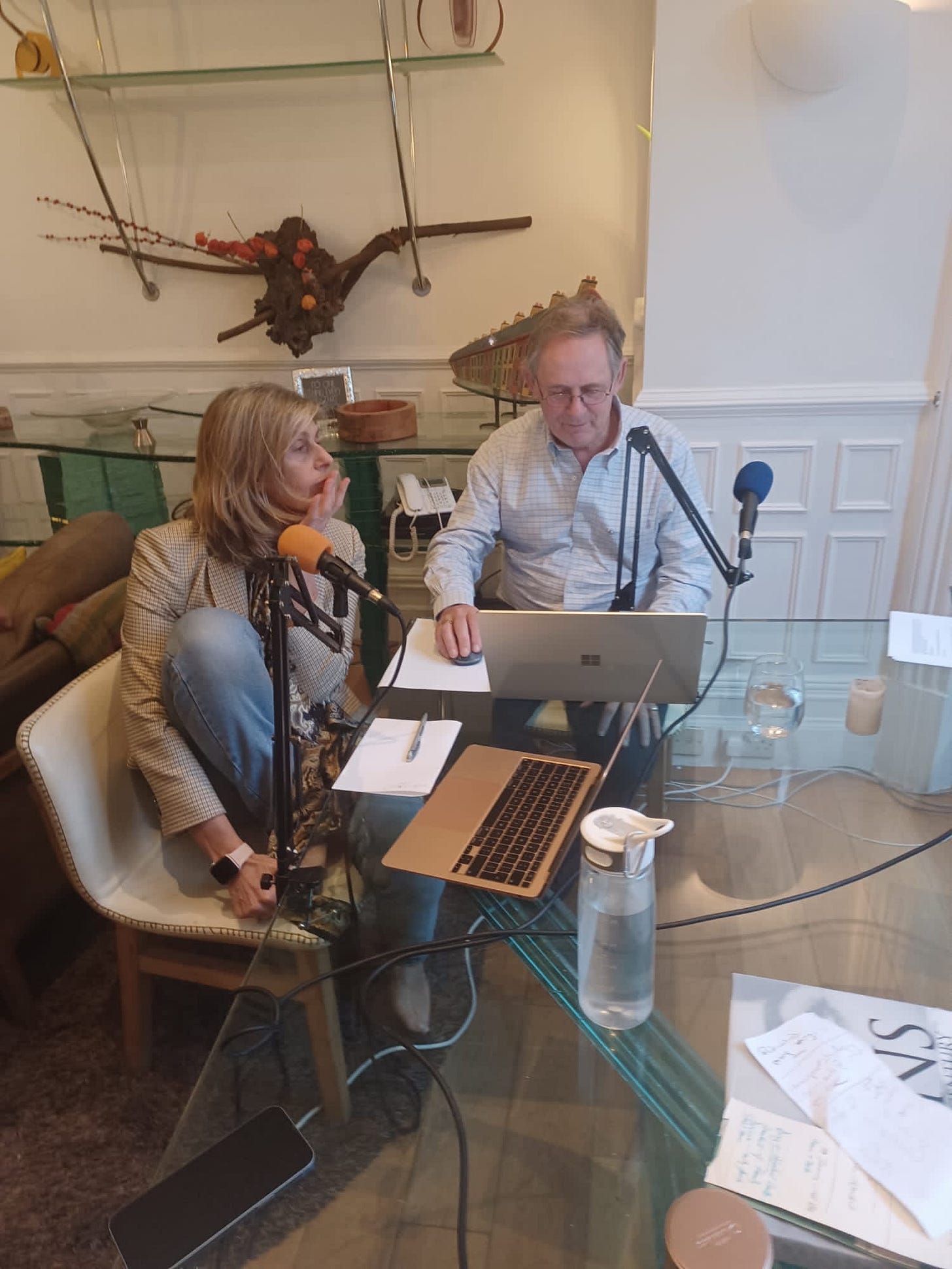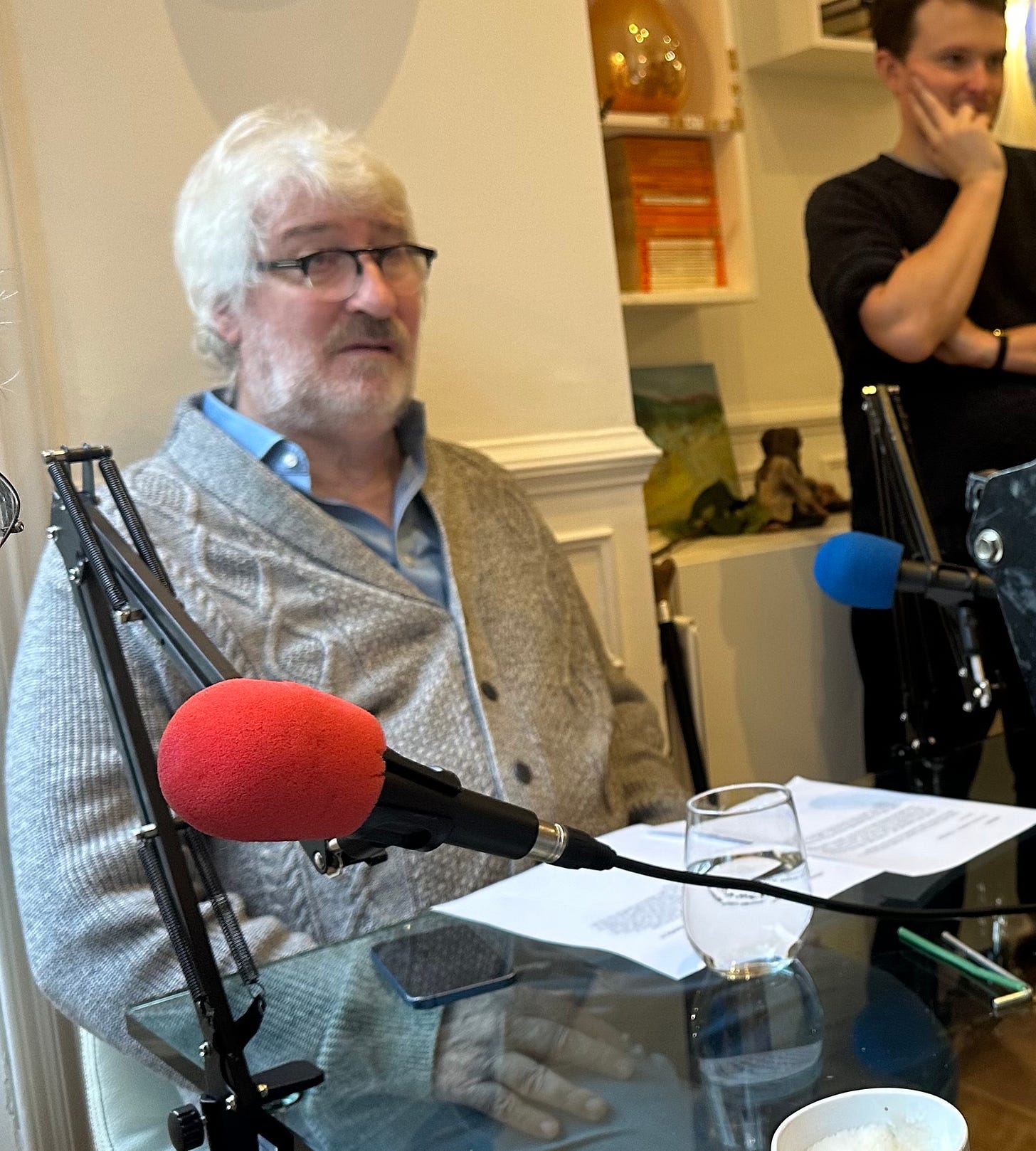When we started this madcap venture of a podcast back in the Spring of this year, many of us wondered whether anyone would listen. After all, five crotchety old pensioners - and one younger woman - blethering away in the pub about an incurable disease does not exactly sound compelling.
How wrong we were. Movers and Shakers immediately found a sizeable audience, not just in the UK Parkinson’s community but around the world, often with people with little or no connection to the degenerative condition. What is more, listeners who contacted us via our email address feedback@moversandshakerspodcast.com made it clear that we were doing something very valuable - starting a conversation about Parkinson’s that simply had not been happening before.
So this week, as we near the end of season two of the podcast, we rummage through the mailbag to look at where that conversation has been heading. We recorded this episode not in the pub but at Gillian’s Hampstead home which then became the venue for a delightful podcast crew Christmas party. And we welcomed back Paul Mayhew-Archer who had great news - his DBS (Deep Brain Stimulation) went without a hitch, his brain is packed with electrodes and he will be “switched on” at the beginning of January. We’ll keep you up to date with how that goes.
So to our mailbag. A big theme is that services for people with Parkinson’s are stretched to breaking point, making what we do all the more important. Elizabeth Wilson writes that she has heard to her dismay the “devastating news” that Nottingham University NHS Trust has suspended its Parkinson’s nurse service due to staff absence.
She goes on:
“I think the podcast Movers and Shakers (which is brilliant, funny, sad, happy and fabulously informative) is destined to become the support network and source of information for Parkinson’s!!!!”
Sophie Langdon writes about how the podcast has helped her family in dealing with her father’s Parkinson’s:
“The process of getting the diagnosis, working out the right treatment, dealing with side effects and all the rest has been a hell of a journey for the whole family but in particular my parents. Your podcast has provided us with many moments to laugh about similar experience whilst also giving reassurance that we are not the only ones dealing with this condition and all its many facets! My Dad in particular has found it useful to find people to relate to (I think he relates to Jeremy most closely though!) and to feel a little less alone with things.”
But before we get too smug, a rap on the knuckles for us from Sarah Talbot. Our episode on diet was hugely popular but Sarah was not impressed by our level of knowledge about the impact of food on people with Parkinson’s:
"l was truly flabbergasted by the diet episode and the reactions from some of the M&Ss. I'm astonished that such erudite, privileged people failed to take action and find things out themselves. Do some research!”
She goes on to say "I was diagnosed nearly 3 years ago and l found out on day 1 how to optimalise my levodopa by avoiding protein and timing meds.”
We admit that we should have done better but then none of us remembers being told anything about diet when we were first diagnosed.
Our correspondents don’t just react to what they hear - they have their own advice on living with Parkinson’s. For Bill Beswick the lesson from a career as a sports psychologist is that it all starts in the mind:
“When faced by challenge – being diagnosed with Parkinsons for example - people have a choice between ‘fighter’ or ‘victim’ mentality. Immediately after receiving the diagnosis I was aware that I had gone into ‘victim’ mentality – Parkinsons ‘had me,’ I didn’t have Parkinsons! Fortunately I have a very strong family around me and I quickly returned to ‘Fighter’ mentality. Thus it is very important to develop a strong attitude to the challenges of our condition, though having said that, we will all have the odd day when we feel and behave as victims.”
For Pru Davenport who retired in 2018 after her Parkinson’s diagnosis, the answer to getting out of thst victim mentality was a return to work: "I recently asked my old boss if there was anything I could do at the office. I am now there 3 mornings a week archiving and my whole world has changed. I have constant pain but the company has lifted me more than any meds.”
We continue to hear disturbing stories of unreasonable waits to see a neurologist, particularly to get a first diagnosis. Avis wrote to us in October:
“Back in Feb this year my husband visited his GP with Parkinson like symptoms, arm & hand tremor, poor gait in left leg also.
He eventually heard he had an appointment with a neurologist at the JR Oxford 13th Oct.
On the 21st Sept he had an email cancelling his appointment & later another giving him one for March 2024…..”
We wrote back to say that waiting more than a year for an appointment was unacceptable and that the family should make a fuss. But Avis and her husband had already made up their minds. In mid-November she wrote to us again in a far more cheerful mood - her husband had finally had an appointment with a consultant and been diagnosed with Parkinson’s:
“We left feeling v relieved & supported. The positive diagnosis didn't surprise us & we're glad no other invasive tests were needed.My husband began the dopamine medication immediately ( Sinemet) & so far so good.
His GP seems to be responding to the diagnosis & has arranged a visit by a Parkinson's support nurse too! “
A happy ending then - except that the appointment had been with a private neurologist. Like an increasing number of people Avis and her husband had found that the only way to get desperately needed treatment was to pay for it - which does not seem right.
Let’s end on a lighter note. Jeremy Paxman, a keen angler himself, reads a letter from Steven Ramsay who explains that his recipe for living with Parkinson’s involves a lot of fishing.
“I háve been obsessed with , mostly bass, fishing for all of my life. Since my diagnosis though it has taken on a new dimension…..fishing has helped me enjoy life better physically and socially. It gets me outdoors regularly too rather than moaning and wallowing in self pity at home..”
So far so good, But then he says he is sad to hear that Jeremy has given up fishing because of the danger of falling while wading in the river and suggests he tries one of the many other forms of the sport. The grand inquisitor is not impressed and tells our listener in no uncertain terms to go forth and multiply.
We had a discussion afterwards about whether we should bleep Jeremy’s intemperate language but decided to leave it. Apologies to Mr Ramsay but most of us have been sworn at by the Grand Inquisitor - particularly the judge when he is being a bit too judgey - so regard it as a badge of honour. At least he has not asked you the same question a dozen times….
At the end of this episode, Jeremy also gives us our quote of the week, perhaps of the series. “I think one of the reasons people listen to this podcast,” he tells us, ”is because we are, by and large, pretty cheerful.” Slightly stunned, we all nod in agreement and vow to be as jovial as Jeremy, as panglossian as Paxman from now on.
A reminder that you can contact us at feedback@moversandshakerspodcast.com






Golly, if this is Jeremy when he’s cheerful, what on earth is he like when he’s grumpy?!
You are to Parkinsons disease what Clarkson is to farming. Youll achieve far more than any other publicity campaign ever will.